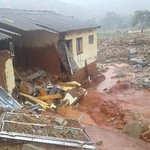Pray the Lord will supply our needs
By Tohru Inoue | Kenya in East Africa

Photo by SIM Stories East Africa
The Kenyan church can raise money. There’s no problem there. A son or daughter of the church struggles with school fees, and people contribute. Someone in the congregation is sick, and people pitch in. Someone needs help with funeral costs, and people open their wallets and purses to give. Perhaps because they know that today it’s you, tomorrow it’s me.
“But if I stand up as a missionary asking for funds,” said an African colleague of mine, “wallets are harder to find and purses seem to close rather quickly.” For mission workers, support raising in this continent can be challenging.
Here, it is acceptable for others to speak and appeal on your behalf, but you shouldn’t speak for yourself. And if there isn’t anyone to speak for you, it’s hard.
Then there are the technological challenges. Automatic debit transactions, those handy functions tethered to credit and debit cards which ensure regular giving even when we forget, haven’t yet made significant inroads. Not having them makes consistent month by month support more of a challenge. Here, giving is still a deliberate and conscious act.
There are seasonal challenges. Particularly in rural areas, giving can also reflect the cyclical, seasonal nature of work. Money is offered after income from the harvest has come in. For the mission workers, this means there are some months when financial support isn’t enough.
There are national and tribal challenges. This same African colleague, who has established himself and his family here in Kenya for the last 30 years, finds the support-raising discussions he has with Kenyan churches slow down once they realise he is not from here.
Then there are global challenges beyond our control. The COVID-19 pandemic has affected giving. As pressure mounted on those who previously had given or pledged to do so, they were faced with the difficult decision of suspending their giving.
Add to all this the waning of interest in international missions here, and it’s hard. Though my colleague and his wife supplement their family’s income through teaching work here and there support through gifts is only consistently about 15 per cent.
With all these challenges, why would anyone even bother attempting mission work? The mission movement should be dead in the water. But God speaks to his people, and they give.
God spoke the word, “Give,” to this same African colleague, and for years they supported workers who, like them, were in need. This is true of other 'under-supported' African workers in Kenya. Their lack of funds has not hindered God from asking them to give too, because God showed them others who were in need. They hunted for coins and bills in their pockets and gave because they know we are all in this together.
Even with the full knowledge of all these challenges, my friend and many like him are lining up to serve. God’s call is so compelling, they have to submit and pray that He will provide for them just as He has for others. Yesterday it was their brother, today it’s them. We’re all in this together.
Support the global worker support fund
Please consider supporting mission workers with financial shortfalls. Give to the global worker’s support fund by visiting our donation page, selecting the office nearest you, and using project number 99758.
Related stories

Uruguay immigrants are putting down New Roots Duplicate 1
Uruguay has a large immigrant population, and students from the vocational programme at the Biblical Seminary of Uruguay, a partner of SIM, realised many foreigners were finding it difficult to adjust to their new home. New Roots ministry was formed to assist these newcomers!
Zimbabwe new stories 2 only en-gb fr
Short Summary
Zimbabwe new stories fr
short summary

